|
|
|
Sort Order |
|
|
|
Items / Page
|
|
|
|
|
|
|
| Srl | Item |
| 1 |
ID:
088474
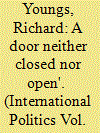

|
|
|
|
|
| Publication |
2009.
|
| Summary/Abstract |
Ukraine provides evidence of very different Common Foreign and Security Policy negotiating dynamics. In the run up to the country's Orange Revolution, significant differences persisted between member states over how the European Union (EU) should support Ukraine's democratic transition. A combination of normative entrapment and co-operative bargaining ensured that 'maximalist' and 'minimalist' member states united around a common position in support of the Orange Revolution. In subsequent debates over whether the EU should offer Ukraine a membership prospect, however, lowest common denominator dynamics prevailed. This case additionally demonstrates that both before and after Ukraine's democratic transition very specific external geostrategic factors played an important role in conditioning EU policy outcomes
|
|
|
|
|
|
|
|
|
|
|
|
|
|
|
|
| 2 |
ID:
052917
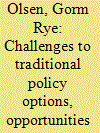

|
|
|
| 3 |
ID:
080875
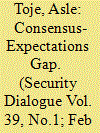

|
|
|
|
|
| Publication |
2008.
|
| Summary/Abstract |
By 2008, what is commonly known as the EU's `capability-expectations gap' has narrowed considerably. While the EU has made notable improvements in terms of its resource availability, as well as the instruments at its disposal, a gap between what the EU member-states are expected to do in the world and what they are actually able to agree upon persists. This article argues that the primary reason why the European Union is unable to deliver the foreign and security policies expected is a lack of decisionmaking procedures capable of overcoming dissent. Repeated attempts to surmount the drawbacks of consensus policymaking have only marginally improved the consistency and effectiveness of the Common Foreign and Security Policy (CFSP). These efforts are assessed by applying consensus as a `conceptual lens' through which to select and assess information. The real-world impact of the lack of cohesiveness, the capacity to make assertive collective decisions and stick to them, is illustrated by Europe's handling of the crisis in the Sudanese province of Darfur in the period 2003-08. The main finding of the article is that as long as the consensus-expectations gap exists, the EU is likely to remain a partial and inconsistent foreign policy actor.
|
|
|
|
|
|
|
|
|
|
|
|
|
|
|
|
| 4 |
ID:
184113


|
|
|
|
|
| Summary/Abstract |
The article explores the evolving positions and negotiation strategies of the EU and its member states regarding lethal autonomous weapon systems (LAWS). Specifically, it traces the proceedings around the UN disarmament forum Convention on Certain Conventional Weapons (CCW) from 2013 to 2020. Embedded in the norm contestation literature, the empirical section draws upon semi-structured interviews as well as document analysis. We find that, despite the absence of a CFSP position on the matter, the EU and key member states have been instrumental in shaping the discussions. However, the role of the EU is constrained due to double contestation. First, at the level of member states contestation persists on what is the appropriate regulatory framework (hard or soft law). Second, contestation is also exerted towards the EU by some member states who contest the EEAS’s involvement. Some are conscious that presenting an “EU position” might constrain their ability to build global coalitions. Others do not want the EU to interfere with their national sovereignty on such a critical security issue. While these two elements work against a common EU position, we also observe a window of opportunity for the EU. Notably, the EU can strengthen the CCW by funding the forum structures and secretariat, which could become an important body in the implementation of foreseeable agreements.
|
|
|
|
|
|
|
|
|
|
|
|
|
|
|
|
| 5 |
ID:
180559
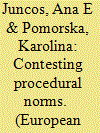

|
|
|
|
|
| Summary/Abstract |
While there is increasing evidence in the literature of politicisation in the area of European foreign policy, we know less about how this has affected the dynamics of cooperation among EU member states and, specifically, the procedural norms that govern this policy. This article is concerned with how politicisation and contestation manifest at the micro-level and how they might shape everyday EU foreign policy negotiations. It seeks to establish to what extent politicisation – resulting from the emergence of a new political cleavage centred around issues of identity and supranational integration – has driven normative contestation within EU foreign policy negotiations and whether this has led to the erosion of long-standing procedural norms in European foreign policy. Our findings suggest that despite CFSP Council committees being an institutional arena, characterised by intergovernmental, relatively insulated, and technical decision-making, current processes of politicisation linked to the rise of populism and the increasing transfer of authority to the EEAS have increased contestation of norms within this setting. However, procedural norms have remained relatively resilient to these challenges.
|
|
|
|
|
|
|
|
|
|
|
|
|
|
|
|
| 6 |
ID:
089898
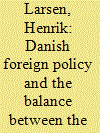

|
|
|
|
|
| Publication |
2009.
|
| Summary/Abstract |
In the international debate, it is often argued that Denmark, in its major foreign policy priorities, has sided with the United States (US) since the Cold War rather than with the European Union (EU) or its European partners. I examine whether this is correct, and if it is, why this is so, since 2001. I also ask whether a different theoretical approach, namely discourse analysis, would lead to findings different from those of the dominant approaches. I first present various ways of explaining why a country chooses the balance that it does between the EU and the US. One particular approach, post-structuralist discourse analysis, is applied. The balance between the EU and the US in the dominant Danish discourse is analysed. I outline the policy level and attempt to map where Danish policies are conducted with the EU and the US, respectively. I show that the EU is the most important partner across foreign policy areas since 2001, despite ad hoc foreign policy cooperation with the US, and that this is due to a dominant discourse articulating the EU as `our most important alliance'. However, the US is the most important partner on military security issues based on a discourse articulating cooperation with the US as a central part of Danish foreign policy identity and an `offensive foreign policy'.
|
|
|
|
|
|
|
|
|
|
|
|
|
|
|
|
| 7 |
ID:
108582
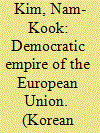

|
|
|
|
|
| Publication |
2011.
|
| Summary/Abstract |
This paper examines the EU's conflicting roles as a global actor between a normative
leader and a realistic compromiser. Since the Kosovo and Iraq wars, the EU has
experienced rapid progress in two policy areas: asylum and refugees; security and
defense. Although the two policy areas belong to different pillars, they were both
accelerated through the wars where Europe painfully recognized its incompetence.
This paper argues that increasing prioritization of security issues eventually
undermines the foundations of the EU's established commitment as a normative
leader in the area of human rights policies. Fortress Europe with strong military
power and clear borders would build the wall between Europe and non-Europe
higher and reinforce the characteristics of the EU as a realistic compromiser that
regenerates the exclusive nature of nation states, only different in its gigantic size.
It would then be difficult to distinguish the EU's identity as a new experiment of
peace projects from a neo-imperial hegemon of the world.
|
|
|
|
|
|
|
|
|
|
|
|
|
|
|
|
| 8 |
ID:
087831
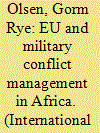

|
|
|
|
|
| Publication |
2009.
|
| Summary/Abstract |
During the 1990s, conflict prevention and conflict management became core priorities of the European Union's policy towards Africa. In the current decade, conflict management with military means has become increasingly important to the EU. The article scrutinizes the efforts of the EU to develop a military conflict management policy and it shows the dynamics and the interests lying behind the two core instruments: EU military operations within the framework of the Common Foreign and Security Polity (CFSP) / European Security and Defence Policy (ESDP) and the funding of 'African solutions to African problems'. It is the argument that development of a military conflict management policy has been and still is motivated by European concerns and European interests. Only secondly is it motivated by concerns for Africa. Because CFSP/ESDP conflict management is guided by the principle of intergovernmentalism, some member states, particularly France, exert significant influence on the EU's conflict management policy in Africa.
|
|
|
|
|
|
|
|
|
|
|
|
|
|
|
|
| 9 |
ID:
085477
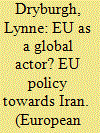

|
|
|
|
|
| Publication |
2008.
|
| Summary/Abstract |
This paper explores EU policy towards Iran to challenge the common implicit or explicit notion that the EU's 'actorness' in the international system rests primarily, or solely, on its Pillar I external relations. Utilising criteria developed to examine the 'actorness' of the EU, the article explores this policy area to demonstrate that the EU's 'actorness' resulted not only from the 'Community' aspects of foreign policy, but also from its Common Foreign and Security Policy (CFSP).
|
|
|
|
|
|
|
|
|
|
|
|
|
|
|
|
| 10 |
ID:
103198
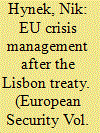

|
|
|
|
|
| Publication |
2011.
|
| Summary/Abstract |
The presented article focuses on key issues and developments in the European Union (EU)'s comprehensive crisis management planning, civil-military coordination and cooperation, as well as the future of the EU Operational Headquarters (OHQ). The article begins with a short overview of key changes in the EU's external action after the Lisbon Treaty, and focuses on the area of Common Foreign and Security Policy (CFSP) and Common Security and Defence Policy (CSDP). The impact of the European External Action Service on CSDP-CFSP cooperation in planning and on EU's crisis management is being examined. Further on, the article continues by addressing the issue area of EU crisis management. After the evolution of the concept and practice at the EU level is examined and different phases are discussed, the article analyses the main political, strategic and operational trends in this field. Indeed, this part reflects on the implications of the Lisbon Treaty for crisis management. What follows is an assessment of the civil-military coordination in the EU's crisis management structures. In order to contextualise the most recent transformations that are investigated at length, basic concepts and terms are outlined, and the evolution of civil-military coordination at the EU level is presented. The final substantive part tackles current and future EU OHQ options. After the necessary contextualisation, the characteristics and shortcomings of the three current options are analysed, and based on these limits, the case for the establishment of a permanent strategic planning and conduct structure in Brussels is put forward. Finally, concluding remarks and recommendations are attached.
|
|
|
|
|
|
|
|
|
|
|
|
|
|
|
|
| 11 |
ID:
119490
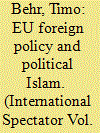

|
|
|
|
|
| Publication |
2013.
|
| Summary/Abstract |
The rise of political Islam in the EU's southern neighbourhood represents a political as well as conceptual challenge to the EU as a foreign policy actor. In the past, the EU reacted to this challenge based on its essentialist perception of political Islam and its overarching interest in regional stability and security. However, the growing salience of 'contingencist' interpretations of political Islam and the resolution of the EU's democratisation-stabilisation dilemma in the wake of the Arab Spring have recently provided an opportunity for greater engagement and cooperation. This has enabled a switch in EU policies from a strategy of containment to a strategy of engagement. Despite this, problems remain as the EU continues to expect Islamist actors to adjust to its own discursive framework and as intra-European divisions revive as a result of the renewal of secular-religious divisions in the neighbourhood. This will complicate EU attempts to build a new partnership with Islamist democracies and will fuel old stereotypes and animosities.
|
|
|
|
|
|
|
|
|
|
|
|
|
|
|
|
| 12 |
ID:
190056
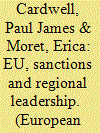

|
|
|
|
|
| Summary/Abstract |
Sanctions have become the “go to” mechanism for addressing foreign and security challenges in the international arena. The European Union’s willingness to impose autonomous (or unilateral) restrictive measures on third countries, and in particular on Russia, has come to the fore at a time when the uptake of new sanctions through the United Nations (UN) framework has stalled. This trend appears to reflect a growing ability to forge consensus among the EU's Member States and use its economic power to support its foreign policy goals. This article considers the extent to which the EU has succeeded in forging a leadership role in sanctions for itself among non-EU states. It examines the alignment or adoption by non-Member States with its sanctions regimes and finds that the EU has a demonstrable claim to regional, if not yet global, leadership.
|
|
|
|
|
|
|
|
|
|
|
|
|
|
|
|
| 13 |
ID:
163648
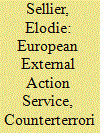

|
|
|
|
|
| Summary/Abstract |
The European External Action Service (EEAS), specifically mandated with enhancing coherence between the Common Foreign and Security Policy (CFSP) and non-CFSP bodies on the one hand, and the European Union and member states on the other hand, has the potential to increase CFSP’s contribution to the fight against terrorism and diminish the boundaries between CFSP and other policies. Several of the EEAS’ cooperation and coordination duties, as well as the inclusive composition of the Service, allow for a more coherent approach to counterterrorism policymaking. In practice, coherence is unfolding in diplomatic cooperation with third countries and Common Security and Defence Policy (CSDP) missions, as CFSP and Justice and Home Affairs actors seem to build on one another’s strengths. The picture is more nuanced in the area of intelligence, where the activities of the EU intelligence centre, transferred from the Council of the European Union to the EEAS, are conditional upon member states’ willingness to exchange information. Ultimately, current efforts towards coherence remain subject to a somewhat paradoxical two-speed process: one that encourages the meshing together of institutional actors and policy cultures, while deferring access to justice to national law, thereby yielding a system of protection of individuals à géométrie variable.
|
|
|
|
|
|
|
|
|
|
|
|
|
|
|
|
| 14 |
ID:
052867
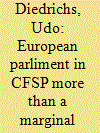

|
|
|
|
|
| Publication |
Apr-Jun 2004.
|
|
|
|
|
|
|
|
|
|
|
|
|
|
|
|
| 15 |
ID:
162509
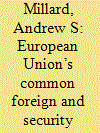

|
|
|
|
|
| Summary/Abstract |
The European Union (EU) is at a turning point. With the bipolar order of the Cold War fast becoming a distant memory, the European Union must quickly establish itself on the global stage before it loses the opportunity to do so. With Northeast Asia fast emerging as a new economic giant and political center for world affairs, the EU must reform its Common Foreign and Security Policy in order to develop a reputation and image as a global actor of soft power, based on its long-standing values and peaceful diplomacy. However, despite major reforms in the Lisbon Treaty (2009), the EU has not been able to form cohesion amongst its members, thus hindering its progress in achieving such international recognition. This paper therefore analyses the reforms taken place so far and suggests further reforms that will build a strong foundation for a united and cohesive foreign policy. It will then look at how the reformed framework will allow the EU to establish itself as a global actor in political affairs, in particular in Northeast Asia.
|
|
|
|
|
|
|
|
|
|
|
|
|
|
|
|
| 16 |
ID:
118006
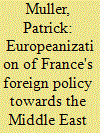

|
|
|
|
|
| Publication |
2013.
|
| Summary/Abstract |
France's prominent role in Europe's policy towards the Arab-Israeli conflict represents an interesting case study for the evolving research on Europeanization. While France's involvement in the CFSP is frequently described as a case of national projection through the EU, this view needs qualification. Proposing a novel conceptual categorization of different member state approaches to European foreign policy cooperation, this article shows that France's involvement in Europe's Middle East policy has gone through different phases. Guided by de Gaulle's politique arabe, France assumed a 'leadership' role in Europe's common foreign policy, leaving a strong mark on its collective diplomacy. Since the 1990s, however, a number of complementary changes have weakened France's capacity for leadership, challenging well-established French foreign policy positions. France's response to the mounting constraints of EU-level cooperation has oscillated between 're-nationalization' and efforts to 'facilitate' a common European approach, displaying a considerable degree of pragmatism and tactical adaptation.
|
|
|
|
|
|
|
|
|
|
|
|
|
|
|
|
| 17 |
ID:
079131
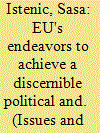

|
|
|
|
|
| Publication |
2007.
|
| Summary/Abstract |
Regionalism and interregionalism have become tools for diplomacy in the post-Cold War era. Successful European integration has heightened the European Union's (EU) desire to become a more effective global actor in international security. The Taiwan Strait is one of the most dangerous flash-points which might trigger a war in Asia. Escalation of the crisis in the Taiwan Strait would undeniably have severe economic, political, and perhaps even military implications for the EU. In the light of the EU's emerging regionalism with East Asia and its efforts to achieve a discernible political and security role in the region, there is an increasing awareness in the EU of the need for it to develop its own security perspective on China and to form its own approach toward the contentious cross-Strait issue
|
|
|
|
|
|
|
|
|
|
|
|
|
|
|
|
| 18 |
ID:
088473
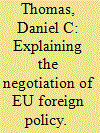

|
|
|
|
|
| Publication |
2009.
|
| Summary/Abstract |
Despite the vast literature on the development of EU foreign policy institutions and the EU's growing experience as an international actor, relatively little effort has been made to explain the often-contentious negotiations among Member States that determine whether or not a common policy is adopted, and if so, what it will be. This paper proposes a Normative Institutionalist theory of intra-EU negotiations on foreign policy and external relations, including hypotheses that explain policy outcomes in terms of entrapment and cooperative bargaining dynamics. It compares these hypotheses' causal mechanisms and observable implications to those of hypotheses derived from Intergovernmentalism as well as theories of Social Learning and Normative Suasion.
|
|
|
|
|
|
|
|
|
|
|
|
|
|
|
|
| 19 |
ID:
116193
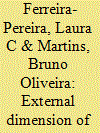

|
|
|
|
|
| Publication |
2012.
|
| Summary/Abstract |
Having recently completed its first decade of existence, the EU's counter-terrorism policy has been receiving increasing scholarly attention as reflected in the specialized literature devoted to this emerging policy area. Its external dimension, nevertheless, has not been the subject of thorough and systematic analyses which scrutinize its characteristic features and principal actors, policies and interests. Against this backdrop, the introductory article of this Special Issue aims at providing a contextualised assessment of the external dimension of EU counter-terrorism while discussing the impact of the Lisbon Treaty upon this policy field. It proceeds with an examination of the policies, interests and actorness dynamics associated with the EU's counter-terrorism policy in highlighting the major findings and conclusions conveyed by the five contributions to this Special Issue. Its conclusion points to possible avenues for future research on the basis of identified underdeveloped topics, under-theorised aspects and neglected issues in the existing literature.
|
|
|
|
|
|
|
|
|
|
|
|
|
|
|
|
| 20 |
ID:
190069
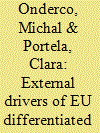

|
|
|
|
|
| Summary/Abstract |
Since its establishment, the Common Foreign and Security Policy (CFSP) has strived to increase convergence among EU member states. Yet, convergence remains elusive and scholars have started to explain the emergence of differentiated cooperation resulting from multiple internal EU crises. We posit that the convergence in the EU member states with respect to nuclear weapons has been fundamentally altered by the humanitarian turn to nuclear disarmament. This has led to a crystallization of differentiated subgroups among the member states, whose membership coincides with that of informal groupings active in the broader nuclear nonproliferation regime. Combining quantitative data on resolution sponsorship at the Non-Proliferation Treaty review process and voting at the UN General Assembly, we show that significant change in the international nuclear nonproliferation regime led to differentiated cooperation within the CFSP, resulting in two cohesive subgroups of member states.
|
|
|
|
|
|
|
|
|
|
|
|
|
|
|
|
|
|
|
|
|